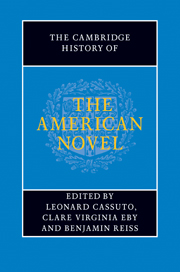Book contents
- Frontmatter
- General Introduction
- PART ONE INVENTING THE AMERICAN NOVEL
- PART TWO REALISM, PROTEST, ACCOMMODATION
- PART THREE MODERNISM AND BEYOND
- PART FOUR CONTEMPORARY FORMATIONS
- Introduction: contemporary formations
- 58 Postmodern novels
- 59 The nonfiction novel
- 60 Disability and the American novel
- 61 Model minorities and the minority model – the neoliberal novel
- 62 The American borderlands novel
- 63 The rise of the Asian American novel
- 64 Toni Morrison and the post-civil rights African American novel
- 65 Hemispheric American novels
- 66 The worlding of the American novel
- 67 The Native American Tradition
- 68 Contemporary ecofiction
- 69 Graphic novels
- 70 Twentieth- and twenty-first-century literary communities
- 71 A history of the future of narrative
- A selected bibliography
- Index
60 - Disability and the American novel
from PART FOUR - CONTEMPORARY FORMATIONS
Published online by Cambridge University Press: 28 July 2011
- Frontmatter
- General Introduction
- PART ONE INVENTING THE AMERICAN NOVEL
- PART TWO REALISM, PROTEST, ACCOMMODATION
- PART THREE MODERNISM AND BEYOND
- PART FOUR CONTEMPORARY FORMATIONS
- Introduction: contemporary formations
- 58 Postmodern novels
- 59 The nonfiction novel
- 60 Disability and the American novel
- 61 Model minorities and the minority model – the neoliberal novel
- 62 The American borderlands novel
- 63 The rise of the Asian American novel
- 64 Toni Morrison and the post-civil rights African American novel
- 65 Hemispheric American novels
- 66 The worlding of the American novel
- 67 The Native American Tradition
- 68 Contemporary ecofiction
- 69 Graphic novels
- 70 Twentieth- and twenty-first-century literary communities
- 71 A history of the future of narrative
- A selected bibliography
- Index
Summary
The origins of imperfection
In an ancient Pima Indian creation story about the origins of the first people, three gods apply their creativity to the sculpting of prototypical human physiques. As the gods hold up their creations for inspection, they exchange critiques regarding imperfections in the models. Ee-ee-toy queries Jahwerta Mahkai and Toehavs about their “queer dolls” by pointing out that Jahwerta's dolls have only one leg and Toehavs's dolls have webbed fingers. Both gods respond to the critiques by claiming alternative capacities for their dolls and consequently for the value of bodily difference. Ee-ee-toy rejects these alternative explanations and throws the dolls away to install his models as the standard. The result of Ee-ee-toy's destructive act is that “sickness and disease” enter into the world.
The origin myth has a double-edged moral for the Pima and contemporary readers. Audiences may imagine themselves as descendants of a “perfect first people,” while also receiving a warning about the disastrous consequences of the devaluation of difference. Pointedly, the exclusion of bodily variation results in vulnerability to decay. The myth also premises the critical role that disability plays in American literary traditions: when human differences of body and mind are rejected, literary narratives often indict the social context of suppression – rather than people with disabilities – as the source of the problem.
- Type
- Chapter
- Information
- The Cambridge History of the American Novel , pp. 1002 - 1015Publisher: Cambridge University PressPrint publication year: 2011



